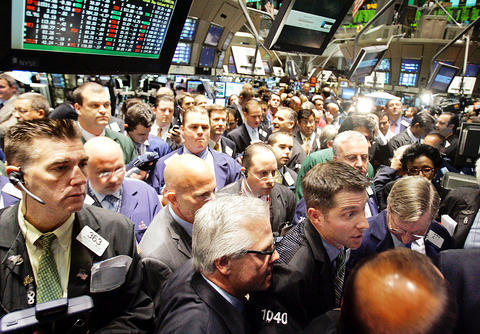After months of hype, hoopla and no small amount of controversy, the Blackstone Group went public on Friday, and with it, lost its "private equity" status.
Its shares, whose symbol is BX -- as in bucks -- was clearly a success. The offering -- priced at US$31, the high end of the expected range -- opened 18 percent higher at US$36.55 and ended trading at US$35.06
The opening was treated almost like a Hollywood premiere at the New York Stock Exchange, where television trucks from networks around the world lined up to report the offering, the biggest on Wall Street and the most high profile since Google went public in 2004.

PHOTO: AP
Blackstone chief executive Stephen Schwarzman, who has attracted much criticism in recent weeks amid the unwanted attention that the stock offering has put on the industry, was not in attendance.
But Tom Wolfe, the author of The Bonfire of the Vanities, was. Walking the floor of the exchange just before the opening, he told a CNBC reporter: "We may be witnessing the end of capitalism as we know it."
Still, the successful offering could presage a wave of followers among private equity firms. Kohlberg Kravis Roberts is considering an offering, as is the Apollo Group.
The stock offering came the same day that more than a dozen Democrats introduced legislation to increase the tax on "carried interest," the performance income earned by many partnerships, including private equity firms. The tax would rise to the ordinary income tax rate of 35 percent, up from the 15 percent capital gains rate now in place. Last week, a bipartisan bill was introduced to increase taxes on firms like Blackstone. Some had speculated that the bill would kill Blackstone's offering or at least lower its valuation, but it appeared to do neither.
Blackstone's offering did not pop the way Fortress Investment Group's offering did in February. That offer surged 68 percent, to US$31, after it raised US$634 million. Those shares have fallen 20 percent since, in part on worries about the possible impact of increased taxes.
With the help of an army of underwriters, 17 in all, Blackstone sold 133.3 million common shares, or a 12.3 percent stake. The company has already sold a US$3 billion nonvoting stake to a Chinese state-owned investment company.
The firm, which started in 1985 with just US$400,000, had a market value of US$38 billion at the close of trading on Friday, giving it a higher market value than more established financial players like Bear Stearns, the investment bank.
No one will reap more from the offering than Blackstone's two founders. With a 24 percent position in the firm, Schwarzman will hold a US$7.7 billion stake and could earn up to US$677 million from the offering's proceeds. That is on top of the nearly US$400 million in compensation he took home last year.
The firm's chairman, Peter Peterson, who is retiring, will earn US$1.88 billion from the offering and will retain a 4 percent stake.

In Italy’s storied gold-making hubs, jewelers are reworking their designs to trim gold content as they race to blunt the effect of record prices and appeal to shoppers watching their budgets. Gold prices hit a record high on Thursday, surging near US$5,600 an ounce, more than double a year ago as geopolitical concerns and jitters over trade pushed investors toward the safe-haven asset. The rally is putting undue pressure on small artisans as they face mounting demands from customers, including international brands, to produce cheaper items, from signature pieces to wedding rings, according to interviews with four independent jewelers in Italy’s main

Macronix International Co (旺宏), the world’s biggest NOR flash memory supplier, yesterday said it would spend NT$22 billion (US$699.1 million) on capacity expansion this year to increase its production of mid-to-low-density memory chips as the world’s major memorychip suppliers are phasing out the market. The company said its planned capital expenditures are about 11 times higher than the NT$1.8 billion it spent on new facilities and equipment last year. A majority of this year’s outlay would be allocated to step up capacity of multi-level cell (MLC) NAND flash memory chips, which are used in embedded multimedia cards (eMMC), a managed

Japanese Prime Minister Sanae Takaichi has talked up the benefits of a weaker yen in a campaign speech, adopting a tone at odds with her finance ministry, which has refused to rule out any options to counter excessive foreign exchange volatility. Takaichi later softened her stance, saying she did not have a preference for the yen’s direction. “People say the weak yen is bad right now, but for export industries, it’s a major opportunity,” Takaichi said on Saturday at a rally for Liberal Democratic Party candidate Daishiro Yamagiwa in Kanagawa Prefecture ahead of a snap election on Sunday. “Whether it’s selling food or

In the wake of strong global demand for AI applications, Taiwan’s export-oriented economy accelerated with the composite index of economic indicators flashing the first “red” light in December for one year, indicating the economy is in booming mode, the National Development Council (NDC) said yesterday. Moreover, the index of leading indicators, which gauges the potential state of the economy over the next six months, also moved higher in December amid growing optimism over the outlook, the NDC said. In December, the index of economic indicators rose one point from a month earlier to 38, at the lower end of the “red” light.